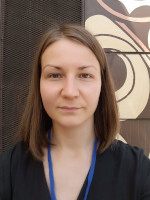Peace in Ukraine from a Feminist Perspective
Interview with Anastasia Chebotaryova by Hanna Manoilenko
Hanna Manoilenko: Anastasia, you are a historian by your background and have been participating in the 8th of March marches in Ukraine since 2017. What does this day mean to you?
Anastasia Chebotaryova: For me as a feminist, the 8th of March has a great symbolic meaning. The history of the day is commonly distorted in the public imagination as a day of “flowers, spring, and femininity.” The reason for this was the Soviet policy in the postwar period: women who had worked in factories during World War II had to be pushed back into reproductive labor to improve the demographic situation and free up jobs for men returning from the front. Thus, the patriarchal image and role of women were actively promoted, including during the March 8th celebrations. It is therefore important for me to communicate the true meaning and significance of this date, particularly by taking part and co-organizing the marches. I have noticed that since 2017, the International Women's Day has started to regain its feminist meaning and has gained more supporters in manifold cities of Ukraine, such as Kyiv, Lviv, Kharkiv, Kherson, Zaporizhzhia, and Lutsk. I love the 8th of March and look forward to the time when we can march with my sisters again in different cities of an independent and peaceful Ukraine.
Hanna Manoilenko:I know Feminist Lodge has been promoting gender equality through educational and cultural activities since 2017. How have you seen your feminist work impacting Ukrainian society? What kind of work have feminist organizations and initiatives been doing during the full-scale war?
Anastasia Chebotaryova: Feminist activism has changed and continues to change Ukrainian social and political life at a tremendous pace. Many feminist initiatives, including Feminist Lodge, have been at the forefront of providing crisis assistance (humanitarian, psychological, legal) to women, girls, and their families affected by Russian armed aggression. Beyond crisis response, the feminist community continues to influence policy making in the country primarily through advocacy work, educational events, writing texts, and networking. Such activism has impacted positive changes. Ukraine has become the first country to ratify the Istanbul Convention during the war. This was facilitated by both the movement's advocacy and the state's course toward European integration. For instance, the 2022 marches in Kyiv and Lviv were supposed to be held in support of the ratification of the Istanbul Convention. Despite marches not taking place because of the full-scale invasion on the 24th of February, we are nevertheless, moving towards a more effective response to GBV.
“Ukraine has become the first country to ratify the Istanbul Convention during the war. This was facilitated by both the movement's advocacy and the state's course toward European integration.”
Hanna Manoilenko: What are the challenges of your feminist peace work (e.g. resistances)? What is your opinion on some Western feminists calling not to supply arms to Ukraine?
Anastasia Chebotaryova: Ukrainian society needs sustainable peace to ensure safety. The situation in Ukraine is complex, and thus, looking for a simple answer might actually threaten the sustainability of peace. A call not to provide Ukraine with arms, as if more weapons in the hands of the victims would mean an escalation of violence, is a vivid example of such a mind trap. This simple formula does not take into account the imbalance of power and the type of violence perpetrated against Ukrainian society as whole, Ukrainian girls and women in particular. Feminists' political work should be strongly informed by power analysis, spanning from the personal to the geopolitical level. Taking into account power imbalances in the case of Russia's invasion of Ukraine should entail acknowledgment and support of the right of those affected by armed aggression to be protected or to protect themselves. The number of recorded crimes committed by the Russian army in the temporarily occupied territories shows that the liberation is a prerequisite for combating violence against women, girls, and other vulnerable populations.
“As a Ukrainian woman and feminist, I feel that my agency and activism are silenced if they do not fit into Western-centered narratives and contexts. But not everything that makes sense for the Global North is universal.”
Hanna Manoilenko:How do you think the challenges you face are connected to global challenges and issues? Do you apply the Women, Peace, and Security Agenda to your work and what role does it play?
Anastasia Chebotaryova: Unfortunately, I observe that the principle of “nothing for us without us” remains declarative. As a Ukrainian woman and feminist, I feel that my agency and activism are silenced if they do not fit into Western-centered narratives and contexts. But not everything that makes sense for the Global North is universal. Contextualization and localization are necessary steps for any activity of such kind.
the UN Resolution 1325 on “Women, Peace and Security” (WPS) has become one of the unifying pillars for women-led organizations on the ground. Ukraine was the first country to ratify WPS amid the localized armed conflict in 2016. The second National Action Plan (2021-2025) has been updated amid the full-scale war. Currently, civil society activists and local government agencies are localizing the NAP to their own realities. They form coalitions and cooperate with various stakeholders to improve the security situation in communities.
“The feminist future for Ukraine cannot be imagined without peace. Peace and security are the keys to further transformations in a society free from discrimination and violence.”
Hanna Manoilenko:What is your feminist vision for peace in Ukraine? What helps you in your daily feminist work?
Anastasia Chebotaryova: The feminist future for Ukraine cannot be imagined without peace. Peace and security are the keys to further transformations in a society free from discrimination and violence. This future is possible only through the achievement of sustainable peace. And sustainable peace is only possible when the Russian troops are withdrawn from the entire territory of Ukraine, and the worldwide nuclear disarmament and decolonization of Eastern Europe, Central Asia, and other places. Our daily work is guided by our belief in a free and peaceful future for our country. We dream of a feminist reconstruction of Ukraine, where the needs of different categories of citizens will be taken into account in all spheres of life.
“We dream of a feminist reconstruction of Ukraine, where the needs of different categories of citizens will be taken into account in all spheres of life.”
Anastasia Chebotaryova is a young grassroots activist based in Kyiv, Ukraine. She is co-founder of the grassroots feminist organization Feminist Lodge as well as researcher of gender studies in Ukrainian and Jewish history. Currently, Anastasia works as a consultant for an international humanitarian organization that works to combat Gender-Based Violence in Crises (GBViC). She is a member of the Ukrainian Feminist Network for Freedom and Democracy.
Hanna Manoilenko is a fellow at PRFI research department International Security. Her research focuses on the ways in which gender and war are intertwined in Ukraine.
|
In Conversation

Anastasia Chebotaryova
Researcher and Grassroot Activist Based in Kyiv

Hanna Manoilenko
PRIF Fellow and Pre-Doc-Researcher